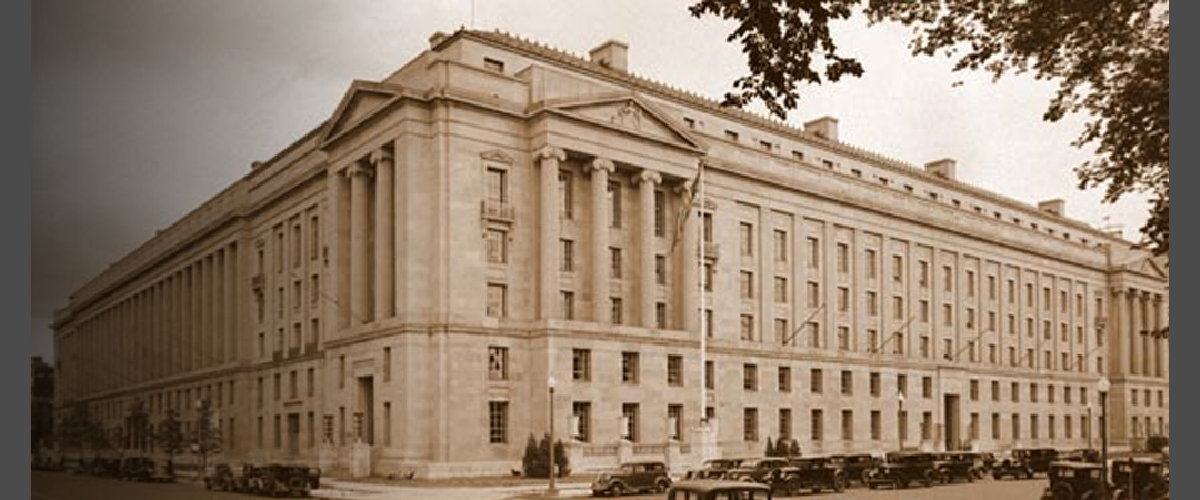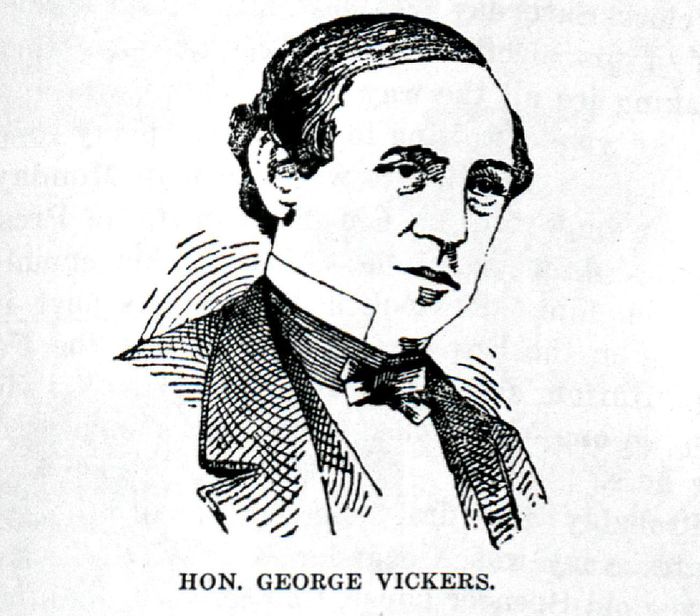Local Lawyer Faced with Pivotal Impeachment Vote
The second week of March 1868, following George Vickers’s election to the U.S. Senate, was very cold. In fact, the Chester River was still frozen. As a consequence, the ice-breaker Chesapeake was sent over to Chestertown from Baltimore, with the committee to inform Vickers of his election, and to transport him first to Annapolis and thence to Washington. Vickers didn’t know they were coming and was no doubt surprised when the committee showed up on the morning of Saturday, March 7, at his Mill Street manse.
Haste was needed — Congress was in session and there were serious matters under way. Only the week before, the Republican-dominated House of Representatives had voted to impeach President Andrew Johnson, the Democratic southerner who had taken over the nation’s top post upon the assassination of Abraham Lincoln. It was the first time in the history of the nation that a president had been impeached.
The articles of impeachment had been sent over to the Senate — where Vickers had just won a seat — and that august body would act as a jury to decide whether the president would be removed from office. In fact, the impeachment trial had already begun.
There were eleven articles of impeachment.
Primarily, President Johnson was accused of violating the Tenure of Office Act, passed on March 2, 1867 over his veto, by replacing Secretary of War Edward M. Stanton with Lorenzo Thomas. There was more to it than that, of course — but the Stanton issue seemed clear-cut to the Republicans. The core fact operating against Johnson was that he was not well liked in D.C., particularly among those who came from northern states, and many thought he was too lenient in his Reconstruction policies in the South.
The 17th president, Johnson was born Dec. 29, 1808 in North Carolina. He moved early on to Tennessee where his first occupation was as a tailor. He was unschooled, but inquisitive and focused. After his wife, the former Miss Eliza McCardle, taught him math and helped him improve his writing skills, he became a voracious reader and began a busy political career. He was elected to Congress in 1843, became the governor of Tennessee in 1853, and was elected by that state’s legislature to the U.S. Senate in 1857. During the war, he was the Union military governor of Tennessee, holding that post until his selection by Lincoln, in 1864, as vice president.
His storied political career notwithstanding, he was not well received when he arrived in Washington, where he was considered an outsider, particularly after his vice-presidential inauguration speech, given with a very noticeable drunken slur. Also, he was a political wild card — his positions difficult to predict. After rising to the presidency, his post-war stance on Reconstruction was controversial — he was too conciliatory to the South and his support for a general amnesty for Confederates put him on the wrong side of the Congressional majority.
Pushing for the impeachment with all his heart and influence was Pennsylvania Congressman Thaddeus Stevens who became one of the House impeachment managers. This ardent abolitionist wanted the South to pay dearly for its transgression of secession and its immoral support and perpetuation of slavery. One of the leaders of the Radical Republican element of the Republican Party, Stevens was the author of the 11th article of impeachment, which his supporters felt would most likely be successful in the president’s removal.
In arguing for conviction, Stevens, in preparation for his April 27, 1868 speech before the U.S. Senate, said it didn’t matter whether the president violated the law, if he violated his oath of office.
Not everyone wanted Johnson removed, even among Republicans. If he were found guilty, lame-duck Sen. Benjamin Wade, president pro tempore of the Senate, would become president, since Johnson didn’t have a vice president. Wade had some controversial beliefs, generally panned by D.C. politicians, including the notion, thought to be ridiculous at the time, that women should be allowed to vote.
The trial took two months to consider three of the 11 articles of impeachment. Supreme Court Chief Justice Salmon P. Chase presided. On May 16, 1868 after various amendments, the vote was taken only on the 11th article of impeachment. Vickers, in his written opinion, gave it a thumbs-down, calling on his legal expertise in review and countering Stevens:
“The eleventh article is anomalous, indefinite, and liable to the objection of multiplicity. If it were possible to put it in the form of an indictment or of a declaration in a civil action, it would be quashed on motion by a court of law.”
The vote was 35-19, one vote shy of the two-thirds majority to convict. Ten days later, the Senate took up the impeachment again. The second article of impeachment resulted in the same vote. As did the vote on the third article. Vickers, by virtue of this alphabetical call of the question, was the last one to vote in the acquit column.
After that, the majority Republicans gave up and declined to prosecute the other eight articles because they didn’t wish to give the “anti-impeachers” and the president the satisfaction of an acquittal, according to the New York Herald.
In effect, the humble lawyer from the pastoral county of Kent, on Maryland’s idyllic Eastern Shore, saved the Johnson presidency.
His constituents were thrilled as demonstrated by the Kent News, May 30, 1868:
“The people of the whole country, and especially those of the border States, have great cause to be thankful that this trial, so-called, has resulted in the acquittal of the President. A different result would doubtless have been followed by measures ever more revolutionary than any which have marked the radical policy in the past. Under the plea of possessing an anti-republican form of government, our own State, in all probability, would have been placed under military rule, the officers chosen by the people displaced, and a complete dictatorship established over us. …”
Johnson, though saved from removal, failed to win the Democratic nomination for a second term as president, wearing the stain of impeachment forever more. New York governor Horatio Seymore was chosen as the candidate from that party to oppose Republican Gen. Ulysses S. Grant who was elected president in November 1868.
Johnson continued in politics, and before his death on July 31, 1875, served a term as senator from Tennessee.
Vickers finished out his single term as senator and then returned to his law practice in Chestertown. He died of heart disease at his home in Chestertown, Oct. 8. 1879. His remains were interred at Chester Cemetery next to his son Benjamin C. Vickers, who had died in 1862 from wounds sustained the Battle of Shiloh in which he had fought for the Confederacy.
Kevin Hemstock writes from Millington. The former editor of the Kent County News, his book, Injustice on the Eastern Shore, was published in 2015. He has also self-published a number of books on the topic of local history.
Common Sense for the Eastern Shore












